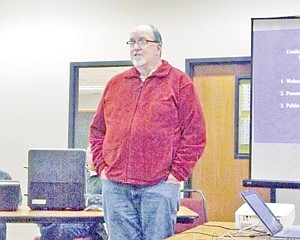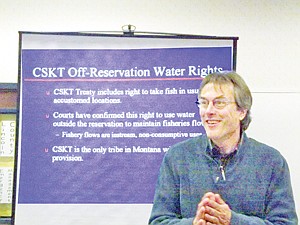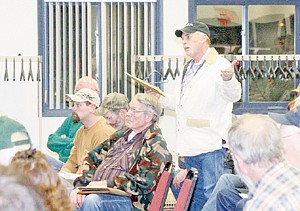Water-rights fears lessened
Ryan Murray | Hagadone News Network | UPDATED 13 years, 2 months AGO
The proposed water-rights compact between the Montana and the Confederated Salish and Kootenai Tribes has had many twists and turns in the past decade, and yet another one came to light in Libby’s Ponderosa Room on Monday night.
And it did so among darkening clouds of the threat of litigation.
Previous iterations of the settlement between the Tribes and the state had mentioned tapping into some of Lincoln County’s most important watersheds; O’Brien Creek in Troy, Libby Creek in Libby and Graves Creek in Eureka.
Those are off the table.
The current bargaining chips are for the Tribes to split existing water-rights claims with Fish, Wildlife & Parks on two streams near Eureka: The Tobacco River and Young Creek.
A third claim, to a certain percentage of water from the Kootenai main-stem, would only go into effect if, for whatever reason, Libby Dam was removed.
As foreboding as that sounds, the tribe was quick to assure Lincoln County residents that wasn’t something they were thinking about.
“We just put that in there as a compromise,” said Tribal Attorney Rhonda Sweeney. “We are looking at our water rights until the end of time, and 200 years from now that facility might not be there.”
Some elected officials in attendance drew issue with what they saw to be the water board’s flippant attitude.
State Sen. Chas Vincent raised his voice in a verbal sparring with Chris Tweeten, Missoula lawyer and chairman of the DNRC Reserved Water Rights Compact Commission.
“What are the management plans?” he said. “I need to see some sort of management plan.”
Other Lincoln County residents had made the drive from Eureka to express concerns.
“The more we go, the more confused I become,” said Steve Curtiss. “I have an 1896 water right and there still appears to be the ability of someone to call on my water right.”
Water rights work on a seniority basis, and with the Fish, Wildlife & Parks claims on Young Creek and the Tobacco River made in 1968 and 1965 respectively, Curtiss would have seniority over the proposed shared rights.
The settlement, as proposed right now, would do little to change existing water rights. The shared rights on the Tobacco River (Eureka’s municipal water source) and Young Creek would not add any volume to the amount. The amount of water licensed to Fish, Wildlife & Parks would simply change to show two owners.
The seniority would not change. Any right-holder with a claim filed before 1965 (for the Tobacco) or 1968 (Young Creek) could not be called upon.
Calling is a water rights term used to make sure a senior water right can stop a junior holding from using the right until the senior one is completely filled.
The Tribes have agreed to cede all other rights in the Kootenai Valley forever, including to tributaries into the Kootenai and the Tobacco River upstream from where it joins Grave Creek.
The tribes are asking for certain in-stream water rights in their “usual and accustomed places,” as specified by the Hellgate Treaty of 1855.
Basin 76D, the one in question, holds Lake Koocanusa, the Kootenai and all connected tributaries. The Yaak River is in 76B. Fisher River in 76C and Bull River and Lower Clark Fork in the 76N basin.
During the entire meeting, and over the compact in general, hung the looming threat of a repeat of a Klamath situation.
The Klamath Tribes, in southern Oregon and northern California, had a water-rights dispute with local farmers and salmon fishermen in the Klamath Basin.
The parties couldn’t agree to a compact, so the case wound up in litigation. For all-intents and purposes, the Klamath Tribes “won,” and the time immemorial fishing rights of the Tribes superseded those of the farmers and fishermen, costing jobs and agriculture.
The threat of a similar situation was tangible Monday evening, and it put some attendees on edge.
Sweeney said that was the last thing the Tribes wanted, and Jay Weiner, the compact commission’s lawyer, wanted to remind those in attendance that compromise wasn’t a dirty word.
“Think of it like risk management,” Weiner said. “You give some up now to avoid the possibility of losing more in the future.”
Messy litigation could very well rule for the Tribes, costing irrigators and fishermen water and fish rights in the Kootenai Valley.
“The alternative to a compact is a darker road,” Tweeten said. “The Tribes could file a lawsuit and all those with filed water claims would become parties.”
While the commission was still taking suggestions for improvements, the plan was for the commission to vote on the compact Dec. 19. If it passed, it would head to the state legislature for a vote.
ARTICLES BY RYAN MURRAY

Eureka brewery turns heads with IPA
Off the beaten path, not far from the Canadian border, intrepid beer drinkers can find the best India Pale Ale in Montana — or at least the best according to the Montana Brewers Association.

Prep Tennis: Trojans romp at Bigfork tourney
The Trojan tennis teams crushed Valley Christian last Thursday 5-1 for the girls and a 6-0 sweep for the boys on their way to the Bigfork Tennis Tournament.
W.F. Morrison principal is fired; no reason given by board
In a surprising unanimous vote last Monday, the Troy School Board decided not to renew the contract of W.F. Morrison Principal Kelly Moore.











